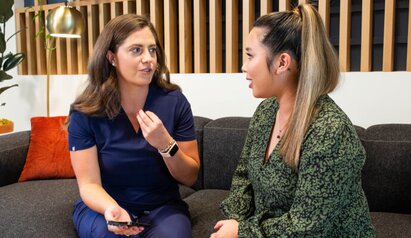Speech Therapy Techniques for Stuttering


Published August 5, 2021

While not all insurance policies will cover voice modification services related to a gender transition, it’s becoming more common as the LGBTQ community gains legislative victories for equal care. But that still doesn’t change the reality that most transgender and gender non-conforming individuals have extreme difficulty receiving proper medical treatment. As speech therapists, we can do our part to remediate this by educating ourselves and offering more inclusive services, which includes gender-affirming voice modification.
My background is in cognitive science with a special interest in neurological impairments and its effects on language and voice. I always knew that I wanted to specialize in speech therapy for adults, but I first began working with transgender women on voice modification in graduate school.
The university that I attended offered a transgender voice and communication group, so I requested to be placed there as a graduate clinician. The time I spent as a part of the transgender voice and communication group showed me a new area of interest within the population I wanted to serve.
The group I worked with was made up of seven transgender women—all at different stages of their transitions. They ranged from not being out in their private lives at all to others who had transitioned decades ago. No matter where they were in their journey, their goal remained the same—they were all seeking to feminize their voices.
This program taught me that gendered communication is so much more than just voice or pitch. People are gendered on more than that. Things like resonance, articulation patterns, inflection, nonverbal communication, language use, and even vocalic aspects—like coughing and laughing—all contribute to how people are perceived when they communicate.
The women I worked with in that graduate group wanted to be correctly gendered in all aspects of their lives, even over the phone. In the years since graduate school, many of my transgender voice clients in my private practice have described feeling dysphoric and “betrayed” by their voices before treatment.
Together, we were working to help make their voices a more accurate representation of their true selves. The women in the group were incredibly motivated to make progress, and as their voices and communication styles became more feminine, I could see the joy that it brought them. I felt that the work that I was doing resulted in truly positive life changes for all of them.
It was the most rewarding feeling I had experienced at the time—and I knew that I wanted to do that as a career. I made a goal of eventually moving back to my hometown of Asheville, North Carolina and starting a private practice that would specialize in adults and transgender voice modification.
Many SLPs are interested in offering voice modification services, but aren’t sure where to start. If that sounds like you, you’ll need to educate yourself not only on how to evaluate and provide gender-affirming voice modification services, but also how to provide culturally competent care for this population. Most SLPs who want to start this kind of treatment might recognize the gaps in their clinical knowledge and seek to address them, but the need for cultural responsiveness can’t be stressed enough.
The transgender and nonbinary communities face discrimination in society, both from people who are intentionally trying to hurt them and from people who think they’re allies. But microaggressions like incorrect terms, pronouns, or names are still harmful, even when it’s done without malice. That’s why it’s important to be properly educated and prepared before you start working with transgender or nonbinary clients.
ASHA’s Special Interest Group 3 (Voice and Voice Disorders) is a good place to look for new educational opportunities. The “Gender Spectrum Voice and Communication” Facebook group is another great place for resources and to reach out to other speech therapists who are experienced in this area. Some are willing to mentor clinicians who are new to this line of work and seeking to learn more.
Other members of that group are transgender or nonbinary voice clinicians who have a more complete understanding of the challenges the transgender community faces. There is also a monthly roundtable discussion that covers a wide variety of topics related to gender-affirming voice services.
Outside of speaking with other clinicians, textbooks and continued reading are another great way to learn more about offering voice modification services. This book, Transforming Voice and Communication with Transgender and Gender-Diverse People: An Evidenced-Based Process as well as this excellent read, Voice and Communication Therapy for the Transgender/Gender Diverse Client, are two resources I’ve used and recommend to others. There’s also a podcast called Speech Uncensored, hosted by SLP Leigh Ann Porter, that has an episode called “Preparing Voice Clinicians to Support Speakers Along the Gender Spectrum,” that may be helpful.
The second key component for new gender-affirming voice clinicians is cultural responsiveness. This requires one to have humility and an open mindset to understand how things they might not intend to be offensive can, in fact, be highly offensive to a person who is transgender or gender non-conforming. Being a good ally means being open to hearing that you aren’t doing things right, and then trying to learn ways to do better.
As a cisgender woman, I know that I’ll never fully understand the struggles of a transgender person, but I always try to improve my understanding and reflect that in my personal and professional life. Dr. AC Goldberg’s website Transplaining is a fantastic resource for more information about cultural competency and advocacy.
Understanding the specific needs and challenges of the populations you serve is an important consideration for any client. I find this to be especially true for transgender and non-binary clients, given the considerable discrimination they might be facing in daily life. Gender-affirming voice modification is a highly rewarding aspect of speech therapy, but it also requires you to be as educated and prepared as possible so you can offer the best care possible.
If you’re an SLP interested in providing these services, you can use some of these resources as a starting point for your own education before you get started. To learn more about how to properly evaluate and provide gender-affirming voice modification, continuing education courses or working with an experienced mentor is recommended. The more educated and culturally competent providers the speech therapy field can provide, the better off our clients will be.

Emily Halder, MA, CCC-SLP is the owner and speech therapist of Blue Ridge Speech and Voice. She has been a licensed and ASHA certified speech-language pathologist since 2012. Her interest in speech therapy began with a love of foreign languages and curiosity about the origin of language. She studied in France for several years before returning to the USA to pursue a bachelor's degree in Cognitive Science with a focus on linguistics from Case Western Reserve University. She then went to UNC Greensboro and obtained my master's degree in Speech-Language Pathology with a special interest in working with adults, specifically brain injury and voice training.
Proudly made in Santa Monica, CA © 2025 SimplePractice, LLC
Proudly made in Santa Monica, CA © 2025
SimplePractice, LLC